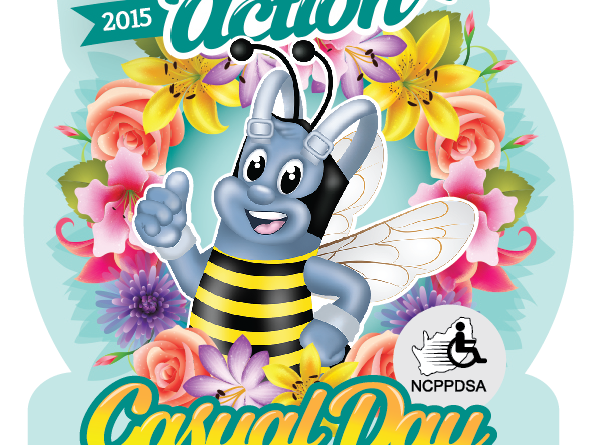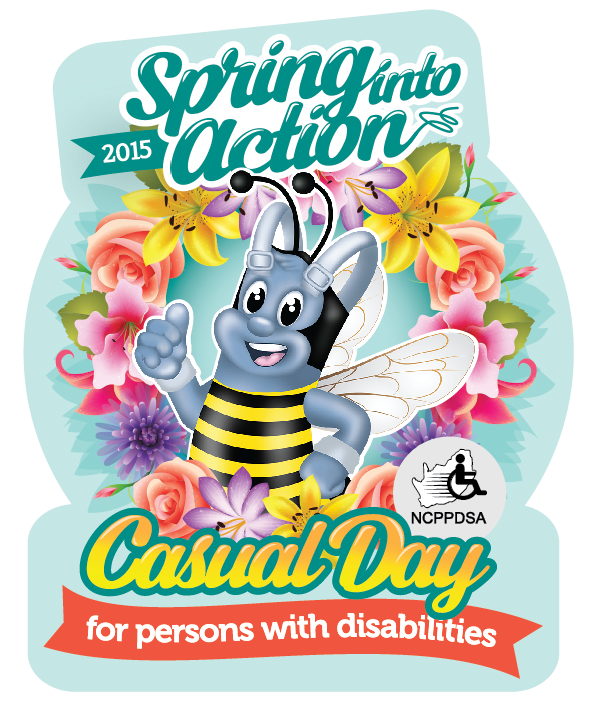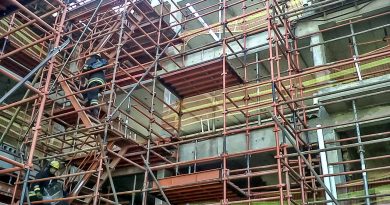Casual Day: where does the money go?
Last year Casual Day was celebrated by over R2.5 million people who donated via a R10 sticker, to persons with disabilities. All in all R28 million was raised. People who bought their stickers from any one of the 300 participating organisations and schools can rest assured that the money they donated went to sustain these organisations, providing education, shelter, assistive devices, transport and accommodation to the persons with disabilities in their care.
All the organsations that participate in Casual Day are appropriately registered entities with their governance in place. For a full list, email info@casday.co.za and zaza@casday.co.za
People who buy their stickers at retail outlets often wonder where the money goes. The funds are distributed amongst Casual Day’s 12 national beneficiary organisations who cover the entire spectrum of persons with disabilities. They are all over the country and you are able to meet them and see they work they do.
Sponsored by the Edcon Group, Casual Day is on Friday 4 September 2015.
The theme for 2015 is Spring into Action – so take your inspiration from the birds and the bees, the skies of blue, the colours of the rainbow, the blossoms on the trees and the minty hue of new leaves. Our colour for the year is refreshing, zingy mint.
The project is owned and managed on behalf of the national beneficiaries by the National Council for Persons with Physical Disabilities in SA (NCPPDSA). This organisation works at government level to improve conditions for persons with disabilities around human rights, transport, jobs and other national issues.
Each province has a provincial branch, called Associations for Persons with Disabilities and each of these have smaller branches in towns and suburbs. The task of these branches is to create jobs, to provide accommodation and support and to represent persons with disabilities in the communities, providing assistive devices, programmes for education and training, and lobbying for rights.
To contact NCPPDSA and its branches, contact: witness.sibiya@ncppdsa.org.za
The South African National Council for the Blind (SANCB) has its head office in Pretoria and acts as a coordinating body for many organisations providing services to persons with visual impairment. Through a network of over 100 member organisations, the SANCB supports and facilitates the prevention of blindness, rehabilitation, community development, training and education of South Africans with visual impairments.
The organisation supplies assistive devices and various technologies to assist persons with visual impairments to function within society. It also creates awareness of the skills, capacities and abilities of persons with visual impairments and provides training in at its Optima College.
SANCB’s education and training division currently supports 21 schools by conducting workshops for educators and lobbying with government on the challenges which face these schools.
To find out more about SANCB visit www.sancb.org.za
The South African Federation for Mental Health (SAFMH) has as its main goal the development of equal, caring services for people having difficulty coping with everyday life, and those with intellectual and/or psychiatric disability. The organisation also creates awareness around mental health issues within communities and strives for the recognition and protection of the rights of individuals with intellectual and/or psychiatric disability. Combating stigma and discrimination is also an important task, as well as forming community self-help groups, preparing and disseminating educational material concerning mental well-being, and conducts research into the causes, incidence and treatment of intellectual and psychiatric disabilities.
July is the organisation’s Psychosocial Disability Awareness month, focusing on mental health in the workplace.
For more info, contact www.safmh.org.za
QuadPara Association of South Africa (QASA) strives to prevent spinal cord injury, as well as protect and promote the interests of people with mobility impairments by formulating a national policy and strategy, to develop and ensure the full potential and quality of their lives.
One of QASA’s most exciting initiatives is its driver training service, Driving Ambitions, which gives persons with mobility impairment the skills achieve their driver’s license.
Another area of focus is that of developing the skills and thereby the employment potential of people with disabilities. Historically, people with disabilities have been prevented from gaining basic and further qualifications through physical and attitudinal barriers to access to such opportunities. QASA has a number of initiatives to tackle these barriers and provide opportunities for people with disabilities to gain skills and qualifications.
QASA’s Digital Villages, in Pretoria, Soweto, Cape Town and Pinetown, KZN, provides free computer training and assists in preparing the learner for the job market.
At national level, QASA is mandated to lobby for accessible transport, a more equitable tax regime for persons with mobility impairments and adjustment of the National Building Regulations to reflect principles of universal design.
For more info on QASA’s work visit www.qasa.co.za
Autism South Africa (ASA) lobbies for awareness around Autism, which is a lifelong, complex condition that occurs as a result of disordered brain growth, structure and development. ASA’s website provides comprehensive listings of schools and organisations all over South Africa that provide services to parents of children with autism, and to children with autism.
An important task for ASA is the public education and awareness around Autism spectrum disorder, which is a new DSM-5 name that reflects a scientific consensus that four previously separate disorders are actually a single condition with different levels of symptom severity in two core domains. ASD now encompasses the previous DSM-IV autistic disorder (autism), Asperger’s disorder, childhood disintegrative disorder, and pervasive developmental disorder not otherwise specified.
To find out more about ASA visit www.aut2know.co.za
Down Syndrome South Africa (DSSA) is committed to finding ways to improve the quality of life of all persons with Down syndrome and other Intellectual disabilities, promoting the idea that they have the right to live with independence, dignity and security as valued adults and full citizens in our society. It endeavours to empower families through dissemination of information, encourages research in the fields of early intervention, education, medical aspects and employment.
For more info visit www.downsyndrome.org.za
National Association for Persons with Cerebral Palsy South Africa (NAPCP) aims to promote the medical, educational, vocational and social services and facilities for persons with cerebral palsy to achieve independence. The organisation also works within communities to eradicate physical, legal and attitudinal barriers that hinder the integration of persons with cerebral palsy into society.
Prevention of cerebral palsy, early detection and prompt and efficient treatment of persons who are, or might become cerebral palsied, is another important goal of the organisation.
For more info visit www.napcp.org.za
South African National Deaf Association (SANDA) is dedicated to providing quality services, ensuring public accessibility and increasing awareness of issues affecting deaf people at all levels in South Africa.
For more info visit www.sandasizwe.co.za
National Institute for the Deaf offer specialised care, education and training to empower and restore human dignity. The NID follows a holistic approach in education and training, health and spiritual care and is the only facility in South Africa and Africa which offers the full spectrum of services to those with hearing loss. South African Sign Language training is crucial to improve communication between Deaf and hearing people in society. NID Academy provides South African Sign Language training courses on a regular basis to address the communication needs within private and public sectors in society.
For more info visit www.deafnet.co.za
Alzheimer’s South Africa provides a comprehensive list of care homes across all nine provinces on its website. The organisation offers a memory screening clinic at its Johannesburg head office, with support groups all over the country. Training, education, awareness, rehabilitation and assistance with coping with a family member with dementia or Alzheimer’s is the focus of the organisation.
For more info visit www.alzheimers.org.za
Deaf Federation of South Africa (DeafSA) co-ordinates and facilitate the process of providing all kinds of services for the purpose of integrating one million Deaf South Africans into mainstream society.
For more about DeafSA consult their Facebook page at https://www.facebook.com/pages/DeafSA
The South African Disability Alliance (SADA) is committed to assisting business in understanding disability and incorporating people with disabilities in opportunities, facilities and activities. SADA represents a constituency of approximately 8% of the country’s population and also the demographics thereof. It is a proud body whose mandate is to develop the capacity, opportunity and empowerment of its collective membership.
Help us to spread the message of the social impact of the funds. Your R10 in Action will highlight where the Casual Day money is spent. The national beneficiaries of Casual Day, through their affiliates and branches all over South Africa, provide services to persons with disabilities.
Casual Day is a way for the disability sector to speak with one voice about ushering in a society that values human rights, inclusion, diversity and universal access to education for all its citizens.

Stickers are available from:
Edgars, Jet, JetMart, Boardmans, CNA, Red Square and Legit;
Absa outlets;
Game and DionWired stores;
Shoprite and Checkers stores; and
And the Casual Day website.
You can contact the organisers of the project on 011 609 7006 or visit our website at www.casualday.co.za
Keep abreast of activities at Casual Day on our Facebook page at www.facebook.com/CasualDaySA
Twitter: @CasualDay_SA
#springintoaction
#CasualDay





